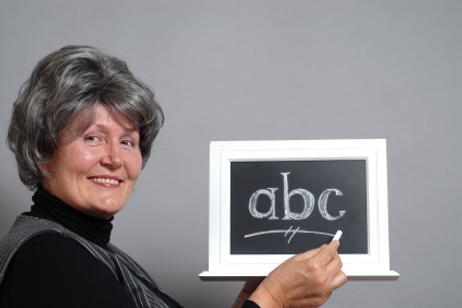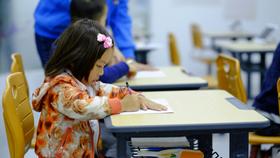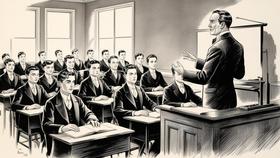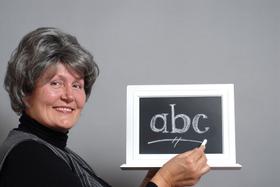In all the years I have written about private schools, I have never written anything about what a teacher does. This year after the pandemic, I feel that it is even more critical than ever to encourage and attract people to the profession. Let me preface my remarks by noting that teaching in a private school is somewhat different from teaching in a public school. The only exception to that statement that I can think of would be teaching in rural schools or other places where the school district is very small. Private schools are free-standing entities. There's no such thing as a district of private schools. As a result, a small PK-6 private school could have twelve teachers or less and a correspondingly tiny administrative staff. So, if small-sized schools appeal to you and prefer being in a situation where your voice can be heard, I recommend that you explore teaching in a small school. Of course, there are large PK-13 private schools with 1,000 or more students. Explore working in one of those if that's your thing.
Something which may appeal to those of you thinking about becoming a teacher later in life is that most private schools will accept your credentials without a teaching certificate. They will generally insist that you earn your teaching certification within a fixed period of a year or so. Most private schools focus on the quality of your tertiary education. So, if you did a bachelor of science with a major in physics or mathematics, all else being equal, you will be hired on the spot. I'm exaggerating a bit, but you get the idea.
Now, let's take a look at the elements of a teacher's duties and responsibilities.
Lesson planning
If you have ever thought that a teacher is just winging it, that there's nothing to it, then think again. Behind that effortless facade of confidence and authority are hours of planning. The view from 10,000 feet shows the text or course material that students have to master over the course of the academic year. At 5,000 feet, you look at a semester's work and its specific deadlines for examinations and reports. Each day's lessons then are carefully worked out to accomplish several goals: to impart the lesson, to assess how students have understood it, to review previously taught material, and to integrate the lessons across the curriculum. Given the reality that children learn in different ways (some learn visually, others aurally, and so on), the challenge is always to present the lesson material efficiently yet effectively so that most, if not all of your students, grasp what you are teaching them. Assessing your students is critical because it is difficult to move on to the next lesson when they haven't mastered what you taught in the previous lesson.
This video offers an overview of lesson planning.
In the classroom
Fortunately, classroom management in most private schools is relatively straightforward because you won't have discipline problems. Moreover, class sizes are small, with 12-15 students being the norm. That means that your students cannot hide in the back of the classroom. Setting up your classroom with appropriate displays and resources such as whiteboards, projectors, and so on takes time. It is usually time well spent because a well-prepared classroom can create an environment for learning that complements your lessons.
Teaching the lesson
Gone are the days when teachers stood at the front of the room and droned on and on at you. To this day, I am scarred by the memory of a particular history teacher who did precisely that when I was in middle school. Thankfully, interactivity and discussion are the watchwords in today's classrooms. A teacher in the 21st-century has mastered a variety of digital aids to enhance and enrich her teaching. But the bottom line is that she knows her subject thoroughly. That's why a successful French teacher has a first and second degree in French language and literature. She is passionate about her subject, and her students know it.
Assessing learning
Asking questions during the lesson, having a pop quiz, asking a student to explain something pertinent to what you taught - these are the tools a good teacher will use while she is teaching. They are second nature to her. Setting term papers, assigning projects, tests, and exams are more comprehensive assessments of mastery levels. These are essential components of the assessment part of teaching.
This video explains what learning assessment is.
Managing discussions
Managing discussions in the classroom is an essential part of a teacher's skills. Keeping young minds on the topic, showing students how to frame an argument, teaching them to defend a position, and so on are all parts of managing discussions. There are several benefits of encouraging discussions. Discussions develop critical thinking skills. They build confidence. They teach young people how to present a winning argument. Discussions also teach young people how to defend their position and to respect the opinions of others. The teacher has to almost invisibly manage the flow of the discussions, making sure that every student has the opportunity to participate.
Meeting with parents
Educating your child is a partnership of three: the school, you, and your child. That is why teachers schedule frequent meetings with the parents of their students. The main focus of those meetings will be your child's academic progress; however, it is also a time to talk about her maturation in other areas. Most private schools seek to educate the whole child.
This video offers an example of a parent-teacher conference.
As you can see from this brief essay, teachers have a lot to do every day. So, support what they do. When you show respect and support for your child's teachers, she will emulate your behavior. Most importantly, you and the teacher are laying the foundations for life-long learning.
Questions? Contact us on Facebook. @privateschoolreview














